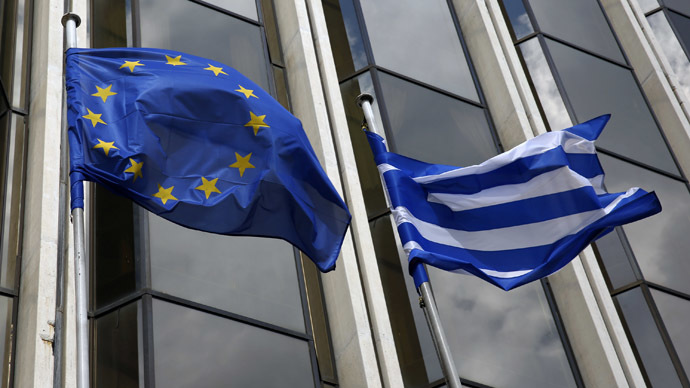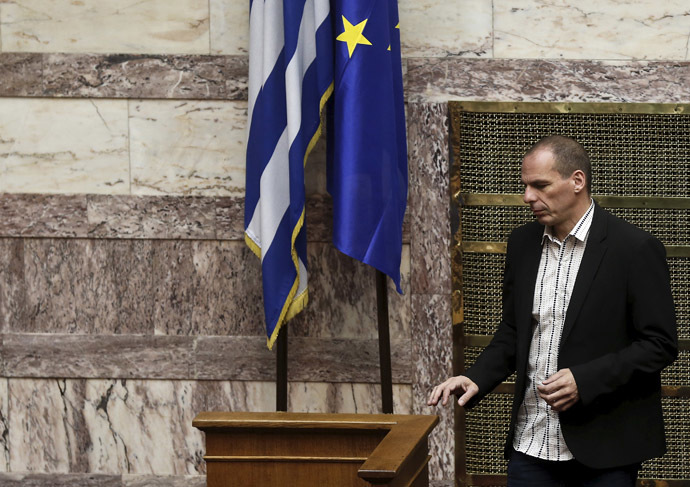‘Default would be best scenario for Greece’

Given the remaining differences in the approach to the bailout between the Greek government and the Troika, a default would be the best thing for the Greek people, Marco Pietropoli, London-based economist, told RT.
RT:Do you think both sides of the dispute, the Greek government and the Troika, will come to an agreement on Greek debt, considering the fact that their approaches differ a lot?
READ MORE: No walls to save eurozone from ‘Greece amputation’ domino effect – Varoufakis
Marco Pietropoli:“No”- is the short answer. I think that they are both starting from extremely different positions. The new Greek government was elected on a mandate to end the painful austerity imposed by the Troika: the IMF, the European Central Bank [ECB], and the EU, and to change the situation for the Greek people which in practice meant either a substantial renegotiation of the terms, or a default on the debt. These are very, very different opposing situations because the Troika effectively is saying: “Well, the previous Greek government signed up to the terms of these bailouts, and the terms of these bailouts should be maintained.” They are sort of suggesting that they will be slightly flexible on the terms but not completely redesigning the bailout. Because there is such difference with the approach I don’t think that a negotiated assessment is possible. My view is…that the best thing for the Greek people is to default on their debts, and that is probably the way it is likely to go.
RT:What can you tell us about the Greek bailout? Why it hasn’t been effective?
MP: ... Let me make it clear: when we talk about a Greek bailout, it is not a bailout of the Greek people. The money that has been given to Greece over the last few years from the Troika has gone nowhere near the Greek people. Something like 90 percent of the Greek bailout has been bailing out the creditors of Greece. That is what it has all been about- it has been protecting the creditors which in large part were European banks, mainly the French and German.
What has happened over the last few years has given time for the creditors of Greece to restructure effectively, what has happened is that the Greek debt has been nationalized by the EU, by the ECB, and by the IMF. That is quite a small amount of private debt which Greece still owes money to. Any default will be principally a default on the money which has been lent to them by the Troika...
Many of the financial institutions in Europe and around the world have been preparing for the eventuality of a Greek default. In many ways a certain amount of firewalls have been built. But this is new territory- there is no precedent of a country within the euro defaulting on its debts and potentially exiting the euro...
RT:While creating the EU, were the countries like Germany and France expecting such negative economic outcome?
MP: ... The EU has developed over decades into really something that in my view was not what they originally planned it to become- more and more like a state rather than what it was originally planned to be, which was a free trade area and no more walls. A lot of the movement towards effectively a federal European state has been quite an undemocratic process. When it comes to Greece we know that when it originally applied to join the eurozone it was turned down. I believe they then went away and employed the likes of Goldman Sachs to help them reapply, and eventually they were accepted into the eurozone. That was done on the basis that they would introduce a certain amount of reforms which they never really did- they still have many protected professions, the tax collection was never really done properly, then the amount of corruption still carried on.

You can put euro in the pocket of a Greek person, or an Italian, or a Spaniard but that doesn’t make them German, and it won’t change the way that they are as human beings, as a social group- it won’t increase their productivity. The way a lot of Europeans are worried is that if they were to exit the euro, they would simply fall back into their own corrupt system which they don’t like...
I think there is some solidarity but what no one wants to accept is that the euro itself is creating poverty in many countries in Southern Europe, or what they call the periphery of Europe. It has to be accepted that these countries are at best in a depression, at worst are continuing to decline. But at the same time they are continuing to build more and more debt. More debt is not the solution, and the only way to change the situation is to change the structure of the euro. But I don’t think that without crisis that would happen.
RT:You said that the euro is creating poverty. So why do you think so?
MP: Pre-euro you had Greeks with the drachma, Italy with the lira, and Germany with the Deutsche mark. The difference in productivity and in the quality of the overall economy, not just productivity but the political system, the whole economic system, the amount of tax system - all of that was naturally decided between the exchange rate. So, weaker countries had weaker exchange rate. When you fix the exchange rate there is no way of changing, of replicating that without some kind of all fiscal means.
Let me explain it in more simple terms. In the UK, for example, there is peace because the richer parts subsidize the poorer parts. Effectively, London and the South-east, broadly the South of England is richer, more taxes are paid. What that means is - that someone going to hospital or schooling in Newcastle or in Northern Wales, broadly speaking gets the same kind of service as someone that lives in Bristol. What you can’t have in a country is a lot of rich people living right next to a lot of poor people - that creates social problems, and potentially civil unrest, revolutions, and the likes. What there has to be is a redistribution of wealth so that there is peace within a country.
By fixing the exchange rate between the different countries, this hasn’t been replaced by any fiscal means for ensuring that the less productive parts of Europe have the investment necessary to maintain the same kind of living standards.
The statements, views and opinions expressed in this column are solely those of the author and do not necessarily represent those of RT.
The statements, views and opinions expressed in this column are solely those of the author and do not necessarily represent those of RT.












